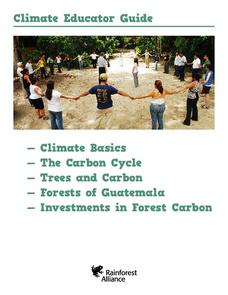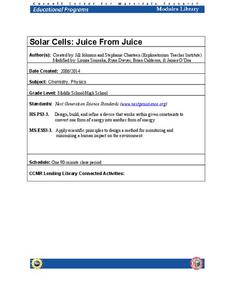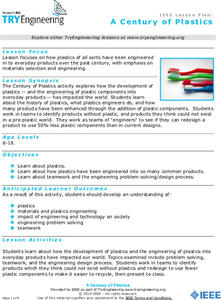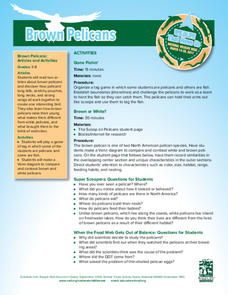Laboratory for Atmospheric and Space Physics
Space Travel Guide
Looking to take a trip? Why not go to space? Here, scholars take on the role as travel agent to create a guide to their favorite planet including travel tips and sightseeing recommendations.
Towson University
Mystery Disease
How did scientists determine the cause of illness before technology? Science scholars play the role of medical researcher in an engaging guided inquiry activity. Using observations, technical reading, and Punnett squares, learners...
Rainforest Alliance
Climate Educator Guide
Climate change is a hot topic in the news. Class members examine carbon dioxide data to analyze trends of our atmospheric makeup over time. They also discuss climate and climate change, and determine how these changes are affecting life...
US Mint
Desert Dwellers
What can a quarter possibly teach young learners about desert ecosystems? More than you might think. After displaying and discussing the included picture of the Arizona state quarter, the class participates in a series of shared reading...
SRI International
Nanofiltration
How can everyone in the world have access to clean drinking water? Throughout the lesson, learners read about and listen to how water is filtered, what the filtration process removes, and the best ways to filter. They explore the...
TryEngineering
Give Binary a Try!
Digital, analog, and now binary clocks? The instructional activity teaches individuals how to interpret binary code. They use an online software program to read binary clocks.
MENSA Education & Research Foundation
Hurricanes
Learn the ins and outs of hurricanes through a series of lessons answering, "What is a hurricane? How does it travel? How is one formed, measured, and named?" Information is presented through informative text and images, while...
Curated OER
“THE LORAX” by Dr. Seuss
Few children's books convey the message of conservation as well as Dr. Seuss' The Lorax. Read the story aloud, emphasizing the interconnectedness of plants and animals in an ecosystem and discussing different ways people can help the...
Institute of Electrical and Electronics Engineers
Telescoping Periscope
Ahoy, matey! Here is an engineering expedition that mini mariners are sure to be swept away by! After reading a brief description and history of periscopes, they work in crews to construct one. Use this activity to enhance a lesson on...
Institute of Electrical and Electronics Engineers
Tinkering with Tops
Get kids' heads spinning by challenging them to design a top that will rotate for a minimum of 10 seconds without leaving a 30-cm circle. Groups of learners collaborate through a planning stage, testing stage, and evaluation stage. Some...
Cornell University
Nano Interactions
Tiny particles can provide big learning opportunities! Middle school scientists explore the world of nanoparticles through reading, discussion, and experiment. Collaborative groups first apply nanotechnology to determine water hardness....
SRI International
Science of Water
Water is crucial to survival. Scholars gain an appreciation for water by reading about it, learning about its atomic properties, and investigating its properties through six stations in a lab activity.
Towson University
Berries...With a Side of DNA?
Sometimes science lab can be ... delicious! Middle school science scholars extract DNA from strawberries and other fruits in an engaging lab activity. The teacher's guide includes pacing, materials list, and worksheets with answer keys.
Alabama Learning Exchange
The Big Bang Theory: An Evidence-Based Argument
What evidence supports the big bang theory? Individuals analyze scholarly resources about the the theory and develop arguments backed by evidence. They brainstorm, share ideas, watch a video, and read articles to complete a graphic...
Cornell University
Solar Cells: Juice From Juice
Unleash the power of ... blackberries! Science superstars create solar cells using the juice of berries or leaves of a citrus tree in an engaging lab. In addition to offering a plethora of resources, the teacher's guide gives background...
Serendip
Using Molecular and Evolutionary Biology to Understand HIV/AIDS and Treatment
HIV mutates rapidly, making treatments challenging to find. Scholars learn about why it mutates so quickly and how scientists race to find treatments. The resource approaches the issue from both a molecular and evolutionary perspective...
Institute of Electrical and Electronics Engineers
A Century of Plastics
After reading about polymer materials, engineer trainees examine how plastics have been integrated into everyday products. In groups, they compile a list of products made entirely without plastics and then, as a closing activity, try to...
Institute of Electrical and Electronics Engineers
Life Vest Challenge
After reading about the history and science of personal floatation devices, patents, and intellectual property, engineering teams design a life vest for a can of soup. To evaluate which groups considered the need for waterproofing, hold...
Institute of Electrical and Electronics Engineers
Adaptive Device Design
After reading about how engineering has made adaptive devices possible for people with disabilities, pupils work in groups to discuss different devices to determine whether or not they are adaptive. They also disassemble a pair of...
National Wildlife Federation
Brown Pelicans
Even animals that are part of the same species have differences. Learners read a passage about white and brown pelicans and compare their features. They recognize that although the birds look very similar, they also have their own unique...
Curated OER
Acid Rain
Create a simulation of acid rain in your classroom with lemon juice and bean plants to help kids study the effects of pollution on plants. In addition, learners will listen to a story and write responses based on guiding questions.
Serendip
Changing Biological Communities – Disturbance and Succession
After cutting down a forest to make a farm, how long would it take the environment to turn an abandoned farm back into a forest? Scholars study this exact scenario while they interpret many charts and graphs of the changing ecosystems as...
Teach Engineering
See the Genes
"If you can't explain it simply, you don't understand it well enough" - Albert Einstein. The sixth installment of a seven-part series teaches young scientists about the importance of being able to communicate scientific research and...
Society for Science & the Public
Easter Islanders Made Tools, Not War
When studying artifacts, especially tools, how do archaeologists determine what the devices were used for? In what ways might researchers' previous experiences influence their perception of an artifact? An article about researchers'...
Other popular searches
- Guided Reading Comprehension
- Flat Stanley Guided Reading
- Guided Reading Lesson Plans
- Guided Reading Lessons
- Guided Reading Activities
- Guided Reading Fluency
- Dinosaur Guided Reading
- Guided Reading Elementary
- Guided Reading Lessons Plans
- Reading Comprehension Guided
- Guided Reading Cam Jansen
- Guided Reading Prediction























